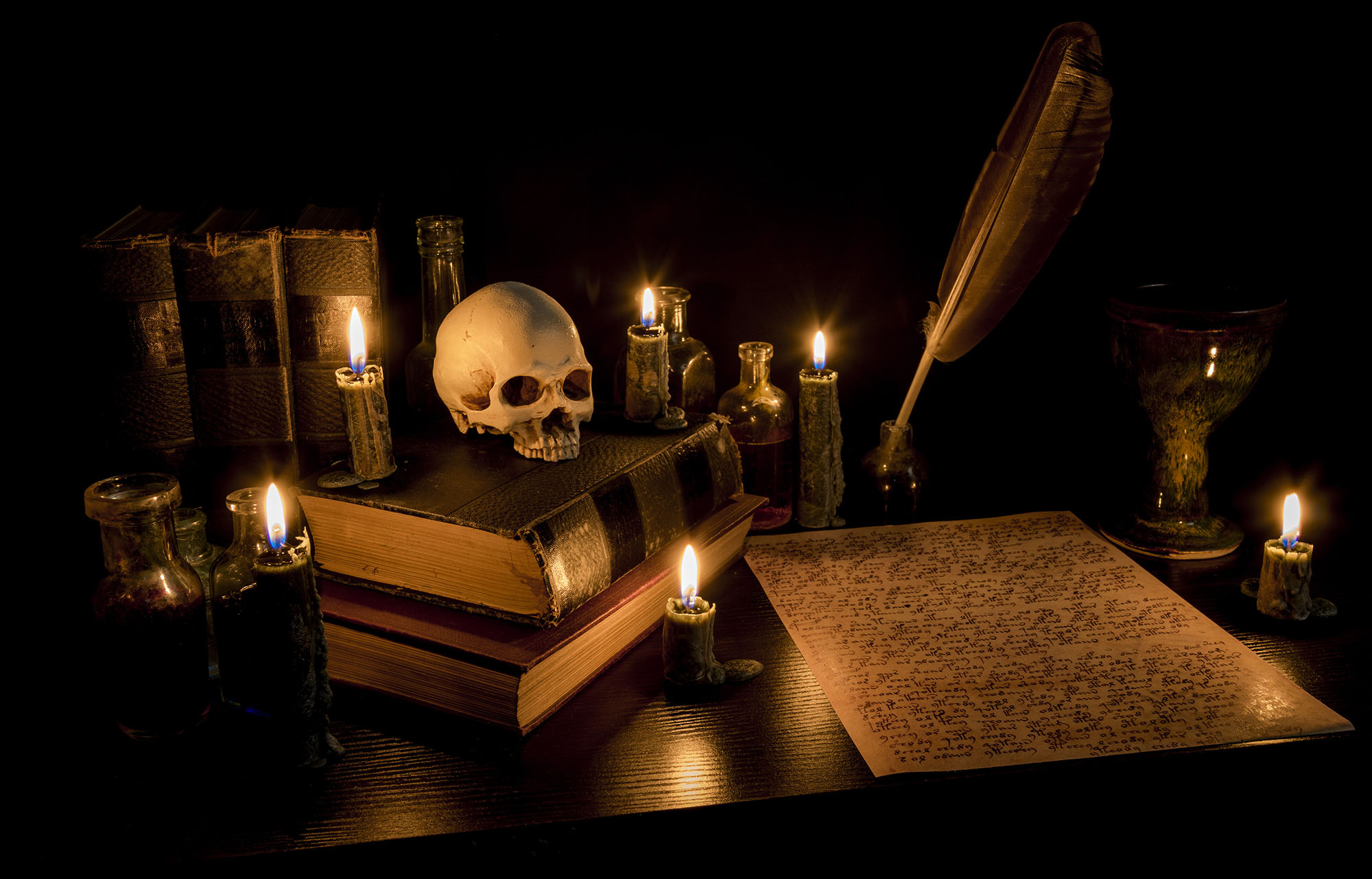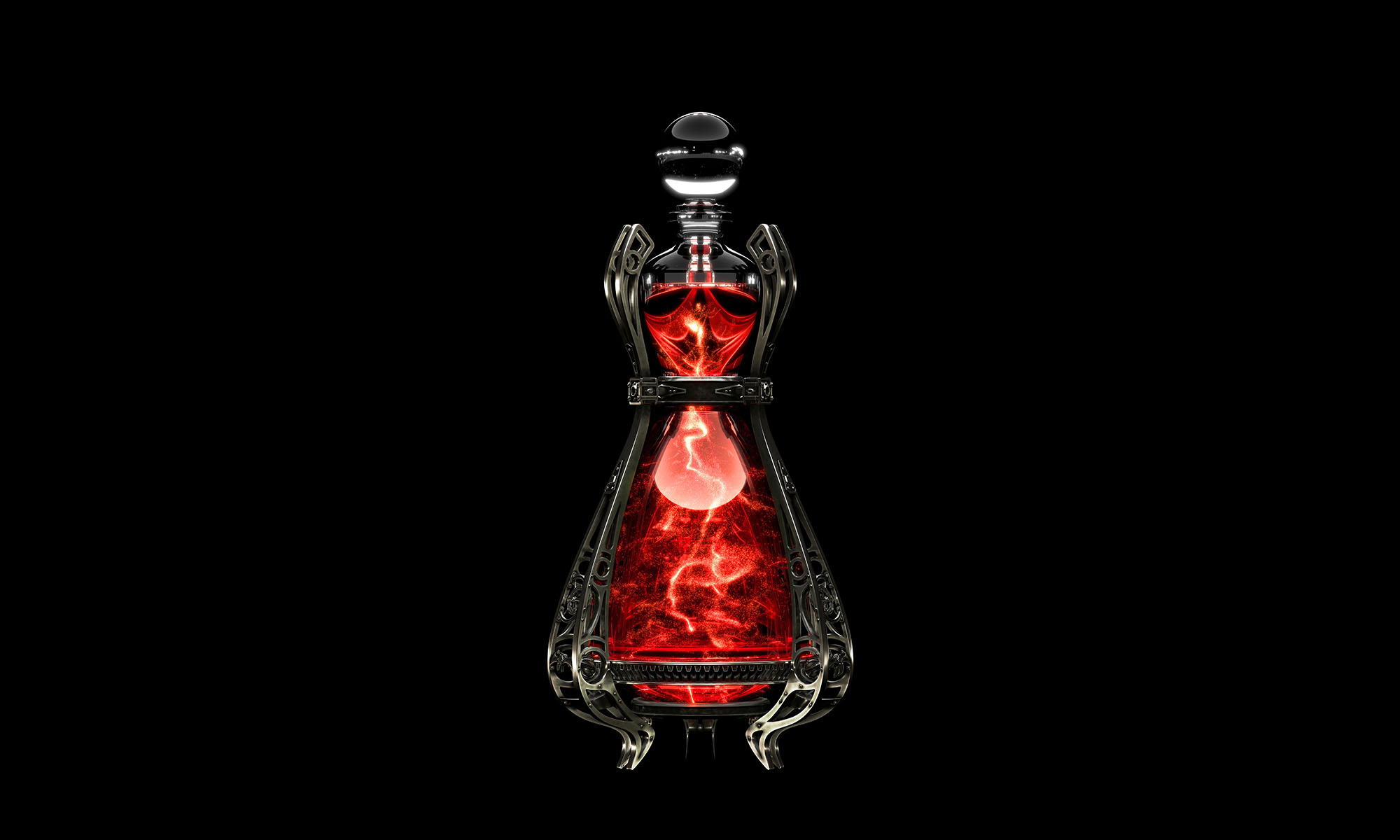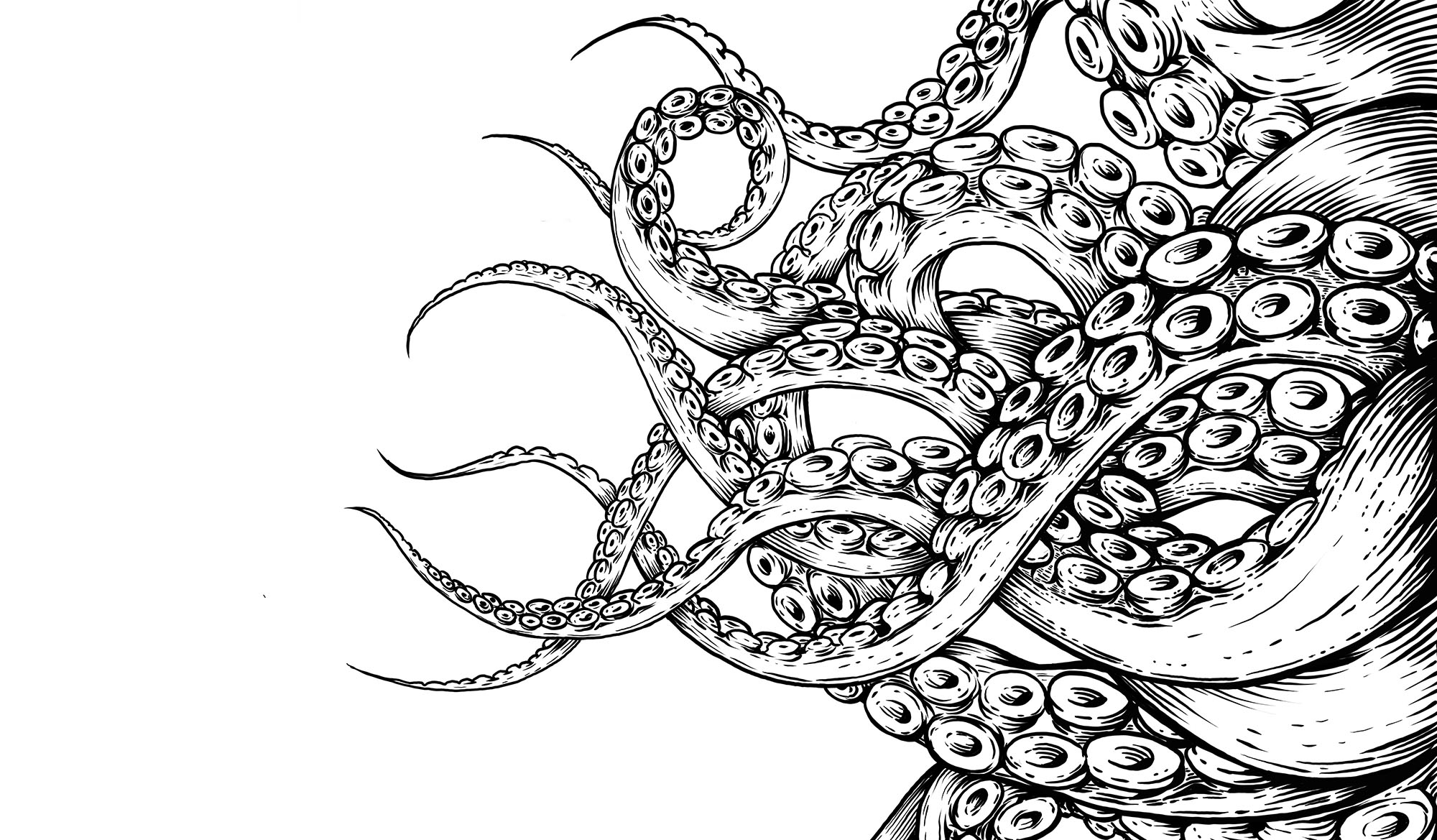
Go to Part 1
Slarkethrel’s modus operandi has historically been to compartmentalize his structures of power. The innermost circles of these organizations have some degree of overlap, with their leaders all becoming indoctrinated in the multifaceted, cultic “truth” of Slarkethrel in different ways, allowing them to cooperate and support each other when necessary. But most members of these groups are largely or entirely unaware that they have any relationship with each other. In the case of the Kraken Society, most of the street-level operatives aren’t even aware that there’s a literal kraken at the top of the pyramid.
PURPLE ROCKS: HERALDS OF THE DEEP
The reavers of Purple Rocks are a recurrent nuisance along the coasts of the Trackless Sea, with small fleets that vary from one or a few ships to as many as two dozen at various points over the past couple hundred years. The Purple Rocks themselves are a small archipelago with a population of a few hundred people dominated by two major islands noted for their purple-and-red sea cliffs.
If a mainlander has heard of Purple Rocks, it’s most likely due to either the reavers acting up again or vilksmaarg cheese – a pungent, salty variety produced from the milk of the strange Purple Rocks goats that is quite popular in the taverns of Luskan. Someone visiting Purple Rocks will find a variety of small fishing villages nestled long the coasts and clefted highlands, filled with Northmen eking out a hardscrabble existence while worshiping familiar northern gods like Tempus, Umberlee, and Auril.
If one were to take a close look at the idols and icons of Tempus and the other gods, however, they might notice the subtle tentacles which have been worked into their design. So, too, is the mundanity of the islands as a whole merely camouflage for the Heralds of the Deep, the Slarkethrelian cult which has quietly dominated the domestic and political life of the Purple Rocks for centuries.
Those who spend time amongst the people here might begin to notice oddities: The curious lack of children, for example. A glassy, too-worn look around the eyes. The strange, fluting trumpets that sound from across the sea and to which many pay an almost uncanny heed. The strange lights that can sometimes be seen from the seacoasts at night and the lights in the highlands above that seem to answer them in kind.
The truth is that the Heralds of the Deep practice rites of human sacrifice, their victims being hurled as offerings into the sea. In return, the people of Purple Rocks receive the Purple Blessing, a strange purple crystal which is boiled down from an alchemical mixture that includes Slarkethrel’s blood and is delivered from the deeps. The crystals are smoked and convey an unnaturally long life. (Those who suffer most from the mutagenic side-effects withdraw from public life and eventually “return to the sea” to join their lord and master.) Most of the population of Purple Rocks is more than a century old. Mainlanders assume that the King Selger who rules here must be the son or grandson of the Selger who reigned before the Spellplague, but not so: It is the same man.
The most recent attempt to free Purple Rocks from the influence of the Heralds came in the mid-14th century, when a popular rebellion on Utheraal – one of the two large islands of Purple Rocks – successfully rose up and crowned King Bromm. In 1368 DR, however, King Selger of Trisk (the other major island) landed his fleet of longships on Utheraal and retook the island. This was done with the full support of the Sword Coast city-states, who had long blamed King Bromm for the reavers who plagued their shipping.
(Oddly, however, it was Selger who had a fleet of longships… not Bromm. An example of how effective the efforts of the krakenar can be in silently shaping mainland opinion and politics.)
THE ASCARLIAN EMPIRE
The sunken city of Ascarle is the capital of an undersea empire. Once quite vast (spreading across an area larger than the Savage Frontier), its borders have been somewhat curtailed in the 15th century. Politically it is a patchwork affair, consisting of various undersea peoples and nations who have been conquered or suborned by Slarkethrel and then usually left as distinct entities rather than being integrated into some larger whole.
Those who are annexed by the Ascarlian Empire are organized into satrapies. The satraps rule their demesnes with tyrannical authority, answering ultimately only to Slarkethrel and the Regent of Ascarle. The satraps may or may not be appointed from the same race and culture as those they govern, but they are always fiercely loyal to the divinity of the Kraken of Purple Rocks.
Slarkethrel has also attempted to infiltrate the satrapies of Ascarle with religious cults dedicated to his worship, efforts which have met with varying degrees of success. These cults often employ imagery and dogma which would be familiar to the Heralds of the Deep and the inner circles of the Kraken Society, but Slarkethrel prefers to keep them separate and distinct from each other.
Note: Although the Heralds of the Deep are kept separate from the imperium, King Selger is treated as a satrap and also answers to the Regent of Ascarle.
(This systemic division of power has undoubtedly contributed to a certain lack of stability in Ascarle’s dominion. On the other hand, it also insulates Slarkethrel’s power base from completely collapsing. Even if the kraken loses vast swaths of what he claims, whatever parts are left will remain whole and complete unto themselves, providing a foundation from which he can inevitably rebuild.)
THE REGENT OF ASCARLE: The Regent of Ascarle is a mind flayer named Vestress.
In 1278 DR, krakenar agents discovered the location of legendary Gauntlgrym, the one-time capital of the dwarven empire of Delzoun. An expedition plundered dwarven treasure and even more valuable lore, but ultimately came into conflict with the illithids who controlled the depths of the ancient city. A final operation within the city sought to pillage knowledge directly from the elder brain (and met with some mitigated success).
The operatives returned to Slarkethrel with vast caches of lore that would take decades to fully catalogue and riches which would fund the kraken’s ambitions to previously unimaginable heights. But it also triggered decades of illithid counterattacks, fueling a rivalry between the mind flayers and the tentacles of the deep that has only ebbed in recent years as a result of Gauntlgrym falling to a dwarven alliance (although it could easily flare up again at any time if something were to fan the flames of what is now centuries-old enmity).
In addition to lore and treasure, the krakenar also brought back a prisoner: Vestress.
Vestress was tortured and questioned by Slarkethrel, who opened her mind, peered into its depths, and then rebuilt it. After her brainwashing, Vestress believed herself to be a rogue illithid who had rebelled against her creche and been cast out for her “crime” of seeking freedom. Vestress believes that Slarkethrel found her and welcomed her into the embrace of its ever-giving tentacles.
At this time, Ascarle was still something of a haunted city. Vestress took it upon herself to assemble a force of “heroes” drawn from across Slarkethrel’s empire – merrow, sea elves, weresharks, kapoacinths, and water weirds – and led them in cleaning out the fell creatures and strange spirits. In the process, she transformed Ascarle into a proper capital city, and Slarkethrel named her the Protectress of the city. From that position, her influence and power simply grew, until she was named Regent of Ascarle in the Year of the Striking Falcon (1333 DR).
Vestress apparently remained in charge of Ascarle during whatever catastrophe separated the city from Slarkethrel and the empire. She is now quite aged, nearing the end of her natural lifespan. There is much speculation about who will become the next Regent of Ascarle, along with an increasing amount of jockeying as rivals seek to position themselves for the seemingly inevitable transition of power.
Go to Part 3: The Society
















